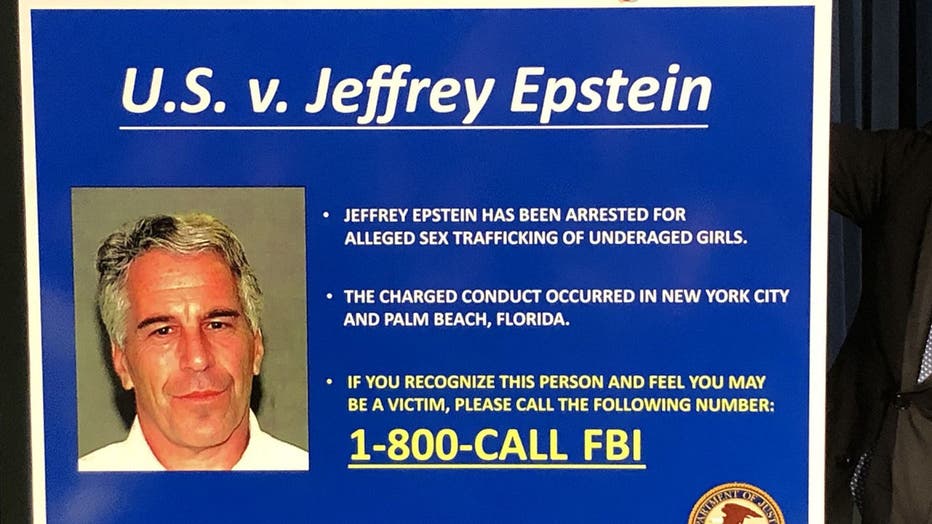For inmates like Epstein, suicide watch meant to be short
Jeffrey Epstein was accused of paying underage girls for massages and molesting them at his homes in Florida and New York.
NEW YORK - Suicide is such a constant concern at federal jails that guards have ready access to "the stick," a wooden pole with a sharpened blade at the end that's used to cut down inmates if they try to hang themselves with bedsheets.
That's believed to be exactly how Jeffrey Epstein took his life Saturday at the Metropolitan Correctional Center's Special Housing Unit after a possible previous attempt, and less than two weeks after he had been taken off suicide watch, in which the lights are left on all night, inmates are not allowed bedsheets, and they are monitored round-the-clock by someone making notes every 15 minutes.
For all the talk from politicians and conspiracy theorists that Epstein should have remained under such scrutiny behind bars, prison experts say suicide watch is intended for only short periods because it puts too much stress on the staff and inmate alike.
"It's just not humane to keep them on those restrictions indefinitely," said Lindsay Hayes, a nationally recognized expert on inmate suicide prevention and a project director for the National Center on Institutions and Alternatives. "Many times, suicidal inmates will deny they're suicidal so they can get their clothes and privileges back."
The 66-year-old Epstein was awaiting trial on charges of sexually abusing dozens of underage girls when he killed himself, taking his life amid a cascading series of breakdowns at the MCC's Special Housing Unit, a chronically overcrowded, understaffed lockup-within-a-lockup that has held some of the world's most notorious terrorists, drug lords, sex traffickers and swindlers. The SHU can hold several dozen inmates at once.
Inmates say the unit - pronounced the "shoe" for short - is a soul-crushing high-rise gulag in the heart of lower Manhattan, with one prisoner once calling its constant noise, sewage leaks, mold, rodents and roaches "a stinking pond of depression whirling in an arc of madness."
"It's a place of torture. It's terrifying," said Sabrina Shroff, a federal public defender who has represented inmates in the unit facing terrorism charges.
Keeping the MCC's inmates from killing themselves is complicated by staffing shortages so severe that correctional officers often work so many overtime shifts in a row that they don't even go home, and employees who have other jobs in the jail are often pulled in to do the work of guards.
RELATED COVERAGE:
Wealthy financier Jeffrey Epstein charged with molesting dozens of girls
Jeffrey Epstein dead from apparent suicide in Manhattan jail cell
Jeffrey Epstein taken off suicide watch before death
Federal New York lockup draws new scrutiny in Epstein death

Unsealed court documents show wealthy financier Jeffrey Epstein was charged with creating and maintaining a network that allowed him to sexually exploit and abuse dozens of underage girls.
Of the two guards responsible for Epstein on the night of his suicide, one was working a fifth straight day of overtime and another was on mandatory overtime. Federal investigators are looking into whether the guards were sleeping on the job and falsified log entries to show they checked on inmates every half-hour as required.
In the meantime, the warden has been removed and the two guards have been placed on leave.
It's not known exactly how many inmates have taken their own lives over the years at MCC, but federal Bureau of Prisons figures show at least 124 killed themselves in the agency's prisons and jails between fiscal years 2010 and 2016. There was no breakdown on how many were on suicide watch.
Getting on suicide watch requires a determination by the institution's suicide prevention coordinator, usually its chief psychologist, that a person may be in imminent danger of suicide.
Hayes said it is not unusual for inmates on suicide watch to be taken off after a few days, because the conditions are so oppressive. Often their clothes and bed linens are taken away, and they are issued heavy, rip- and fold-resistant smocks and blankets to reduce the risk of hanging.
They are typically provided only finger foods so they do not have to be given utensils. Visits and phone calls are curtailed, and the inmates are often confined to their cells for up to 23 hours a day, unable to shower or exercise.
Typically no cameras are trained on inmates on suicide watch because of federal guidelines restricting such monitoring in areas where prisoners are likely to be naked. But a guard or specially trained inmate watches from a chair outside the cell, taking notes on what the prisoner is doing.
Guidelines say inmates are removed from suicide watch only when they are deemed no longer an imminent risk for suicide and only after face-to-face evaluation by the chief psychologist or a doctoral-level psychologist.
In Epstein's case, he was put on suicide watch after he was found on the floor of his cell with bruises on his neck July 23. By August, he was returned to a SHU cell, able to meet with his lawyers for up to 12 hours a day.
Inmates in SHU are typically paired with a cellmate and checked on by guards every half-hour. They are provided a mattress, blankets, a pillow and sheets, normal prison clothing, regular meals and access to a wash basin and toilet. Epstein had a cellmate for a while but was alone after the cellmate was transferred out.
Jack Donson, a retired treatment specialist who worked for the Bureau of Prisons for more than two decades, disputed any notion that Epstein was removed from suicide watch prematurely.
If anything, he said, Epstein spent more time on it than is typical: "It was really at least double what the agency policy suggests."
___
Associated Press writers Jim Mustian and Michael R. Sisak in New York contributed to this report. Biesecker reported from Washington.

